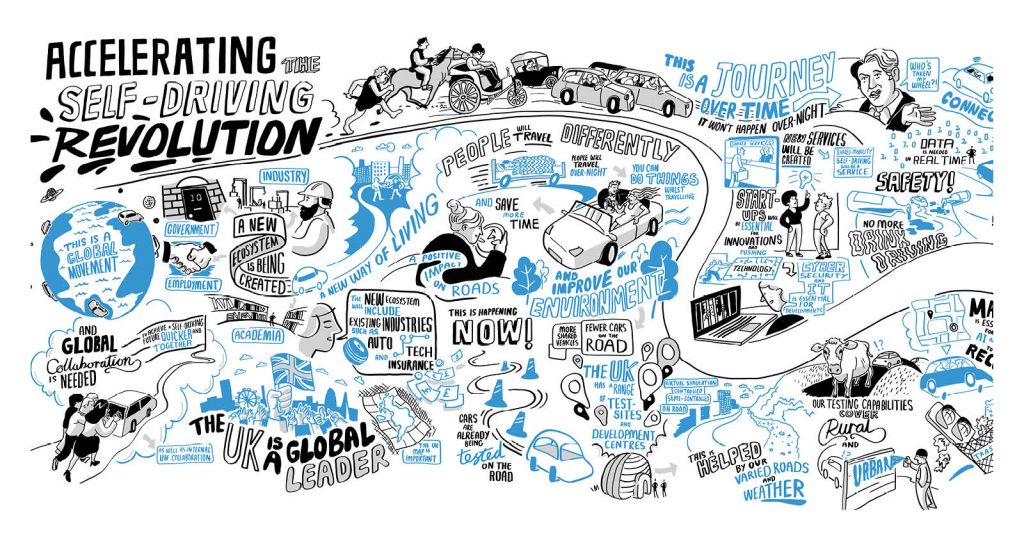The UK is already a leader in the testing and development of connected and autonomous vehicles (CAVs). We have great skills in technology and engineering, innovative starts-ups and established companies, and a Government that makes us a ‘CAV-friendly’ country. Developers can test self-driving vehicles on any road in the UK, while government and industry have invested significantly in R&D and creating new facilities for self-driving research.

Ambitious targets
Now further government funding has been announced to consolidate our position. Four consortia have been awarded grants totalling £18 million to deliver new self-driving technology testing and development facilities in the UK. Investments by these consortia, which comprise companies based not just at home, but also from Germany, Spain and Japan, bring the total to £33m. This is a strong endorsement of the UK’s strategy and demonstrates its international appeal.
These facilities, based in the heart of the country, the Midlands, are part of a growing integrated ecosystem which is scoped and coordinated by Meridian, the unique hub designed to safely accelerate the self-driving revolution in the UK and to support the Government’s goal of having fully operating autonomous vehicles on UK roads by 2021.
Delivering world class facilities
These initiatives build on the investment already made in four world class testbeds, offering the safest and most diverse set of physical and virtual testing capability for self-driving vehicle technology – all within a two hour drive.
This funding for new facilities will ensure that the UK has a complete suite of capabilities for testing, development and deployment of connected and autonomous vehicles. Last year the Government funded consortia to deliver controlled and semi-controlled environments at Millbrook and Race, public urban test facilities at both Midlands Future Mobility and Smart Mobility Living Lab London, and a limit handling facility, Tic-IT at HORIBA MIRA.
A ‘one stop shop’ for CAV development
This additional investment adds highways, rural and parking to the UK’s testing facilities along with a commercially focused data exchange to maximise the benefits of connected vehicles. As these facilities come online, companies and transport operators from around the world can use the UK as a ‘one stop shop’ to develop technology and business models. It is possible to develop and prove first/last mile delivery between cities and rural communities, safety critical systems, new parking services and new technologies to measure, monitor and control traffic. All this can be done at whatever scale is needed to deliver the of benefits from CAV vehicles sooner. Add in the unique coordinating role played by Meridian that enables facilities to seamlessly complement one another, the whole is truly greater than the sum of the parts.
The four new projects, which form part of the Centre for Connected and Autonomous Vehicles (CCAV) and Meridian’s £100m infrastructure programme delivered through Innovate, comprise:
-
Connected Vehicle data Exchange (ConVEx)
Led by Germany’s Bosch – an open platform for the commercial exchange of data to accelerate the development of CAVs. This will help position the UK as a leader in CAV R&D and accelerate the benefits including improved safety, easier access to mobility and more efficient transport.
-
Highway Intersections
Ww will see 6km of track added to Bruntingthorpe Proving Ground, now part of the UK’s extensive testing and development network. These will be able to mimic a wide variety of road junctions from motorways to rural A and B roads to allow self-driving technology to be tested in a representative, safe and secure way. The track extensions will be designed by Spain’s Applus IDIADA, which has experience of designing and operating some of the world’s most comprehensive proving grounds.
-
Rural and Highway
Extensions have been added to the Midlands Future Mobility consortium which is already testing a full suite of urban environments. Adding 259 km of real-world driving situations will help establish confidence in the technology and provide invaluable learning for making CAVs a commercially viable and desirable means of road transport.
-
Self-parking cars
These could be on a street near you by 2021, dramatically improving parking efficiency, being developed by Park-IT, a consortium comprising Japanese-owned HORIBA MIRA and Coventry University. They will be creating a set of bespoke and realistic controlled parking scenarios on the MIRA technology park, to test and support the development of future connected and automated parking solutions.
Today’s announcement adds a further 6km of private testing ground at Bruntingthorpe and 259km of public rural and highway road, making the Meridian testing cluster nearly 600 km in total. With the addition of rural as well as highways in the latest announcement it means everyone will have the opportunity to benefit from this revolution in mobility.
This is a great news story for the UK. Leading technology businesses from Japan, Germany and Spain, alongside successful and innovative homegrown players are endorsing the UK CAV technology industry in what is a globally competitive sector. We’ve got the talent, the tools, strong government support and a highly collaborative culture; and these are consolidating our world leading position at this stage of the transport revolution.


